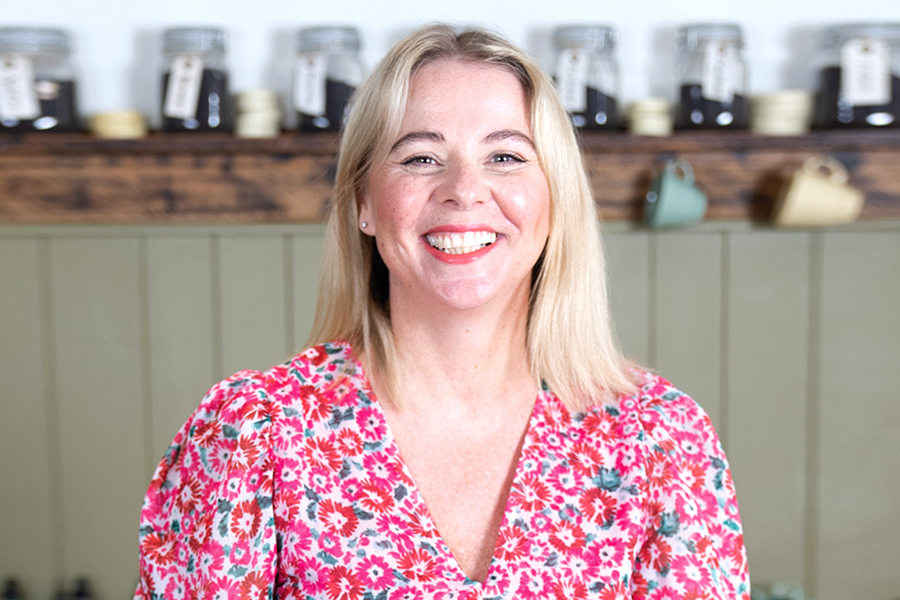
How LUSH is driving a conscious beauty revolution
British conscious beauty brand LUSH Cosmetics has set a target to become carbon-neutral by 2030. In an exclusive interview with IMAGES RetailME, Anita Baker, Managing Director – MENA, LUSH Cosmetics discussed how the brand has always been conscious to not leave the environment, animals or indigenous people as afterthought. That’s how LUSH is driving a conscious beauty revolution.
Flip a soap bar or a bottle of body mist to check the label and you will see the face of the person who made the product, when it was made and by when it should be used. While purchasing a LUSH product a customer knows that no animals were harmed and that farmers are paid fair wages and that they played their part in reducing the use of plastic by purchasing an unpackaged product. All examples of how LUSH Cosmetics is driving a conscious beauty revolution.
Almost 70% of LUSH products have an alternate “naked” or packaging-free version available, which isn’t a recent endeavour. Way back in 1989 LUSH invented its bath bombs, a package-free alternative to bubble bath or bath salts. The brand launched its package-free shampoo bar in the following year in 1990. For understanding one shampoo bar saves three 250-ml bottles that would otherwise be wasted. In the past year LUSH introduced reusable containers made from recycled plastic for some of its products.
Customers can bring back pots to be recycled with Tadweer in the Middle East and they get incentivised. Meanwhile, the cork pot used to store LUSH products is a carbon-positive piece of packaging removing over 33 times its weight in carbon dioxide for every single pot. Sourced from southern Portugal they support rewilding projects in the region while helping shampoo bars stay dry and last longer.
LUSH is also committed to using ethically sourced ingredients in its products with a focus on sustainable farming practices and fair trade. From the Lebanese Neroli oil to Turkey’s refugee rose pickers, the brand has worked to expand its partnerships with suppliers who share its commitment towards ethical sourcing.
“With the recent climate crisis, climate change awareness campaigns are trendy, at LUSH these are not trends for us; they were infused into the business from the beginning. We have been always conscious of our carbon footprint,” Baker emphasised.
Carbon-neutral by 2030
As a signatory of the United Nations Global Compact (UNGC) LUSH has committed to aligning its operations and strategies within the areas of human rights, labour, environment and anticorruption. For instance, LUSH has set a target to become carbon-neutral by 2030 and has made significant progress towards this goal in recent years. The company has invested in renewable energy solutions, implemented energy efficient technologies and worked to reduce emissions from its supply chain.
LUSH has also been implementing sustainable design principles in its stores using recycled and repurposed materials, energy-efficient lighting and other eco-friendly features. For instance, in the past year LUSH opened its first-ever carbon neutral store in Milan.
“Our shop designs play an important part in our eco mission, and we continue to be sustainable using reclaimed wood, eco-friendly paint with low VOC, tiles made of recycled material and building management systems that control lighting and heating to save energy. This is implemented in all our shops, including our recently refitted, Lanolin[1]free Dubai Mall store,” Baker stated.
Navigating unique challenges
As a brand that practises sustainability across its flywheel LUSH also faces and continues to navigate unique challenges and roadblocks in the MENA region.
“At the product level, a big challenge is that we get most of our products from the UK. To cut down on our carbon footprint we sea freight as many ranges as we can. When we require the product on a shorter timeline, we air freight it in and then charge ourselves with a carbon tax to hold ourselves accountable,” Baker shared.
Another challenge that LUSH faces in the MENA region is the lack of recycling infrastructure. While the company has introduced packaging-free products and recyclable packaging there aren’t adequate facilities to collect and recycle these materials in some areas. “In addition, our commitment to animal welfare and vegetarian ingredients may not be as widely understood or accepted in some parts of the MENA region,” Baker pointed out. “This can create challenges as we seek to educate consumers and build awareness towards our sustainability initiatives.”
Building a better world for the future generations
“I strongly believe that understanding and implementing sustainable development principles is crucial to build a better world for the future generations. Sustainable development is a concept that emphasises the need to balance economic, social and environmental factors to ensure long-term well-being for all. We must recognise that the planet’s resources are finite, and our actions have consequences for future generations,” Baker stressed. “By adopting sustainable practices, we can reduce our impact on the environment, conserve resources and promote social and economic equity. This will help to create a world that is more resilient, equitable and prosperous for all.”
“Since small changes can make a big impact, it is essential to prioritise sustainability in all aspects of our lives, from the products we buy to the policies we support. We must work together to create a sustainable future, and that requires action from all of us,” she added.
A big reason why LUSH constantly engages with a wide range of people including customers, employees and non-governmental organisations (NGOs) to understand their perspectives on sustainability issues and incorporate their feedback into its strategy. The company has also worked to build relationships with suppliers and business partners to ensure that its sustainability initiatives are aligned with their values and priorities.
Notifications